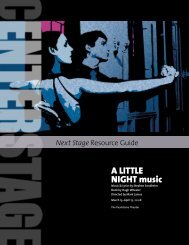Joe turner's Come and Gone - Center Stage
Joe turner's Come and Gone - Center Stage
Joe turner's Come and Gone - Center Stage
You also want an ePaper? Increase the reach of your titles
YUMPU automatically turns print PDFs into web optimized ePapers that Google loves.
The Blues Story of “<strong>Joe</strong> Turner”<br />
by Faedra Chatard Carpenter, Production Dramaturg<br />
Known by many as<br />
“The Father of the Blues,”<br />
W. C. H<strong>and</strong>y (1873–1958)<br />
composed some of the first Blues<br />
songs ever recorded. Among his<br />
most popular <strong>and</strong> commercially<br />
successful was “<strong>Joe</strong> Turner Blues,”<br />
inspired by the inequitable<br />
actions of the legendary lawman,<br />
<strong>Joe</strong> Turney, brother of Tennessee<br />
governor Pete Turney.<br />
Protected by his brother’s<br />
position <strong>and</strong> aided by the institutionalized racism of the<br />
South, <strong>Joe</strong> Turney was among those who participated in<br />
the practice of imprisoning Black men in order to profit<br />
from their unpaid labor. As W. C. H<strong>and</strong>y explained, the<br />
ominous figure of <strong>Joe</strong> Turney was woven into the tapestry<br />
of Black folklore under the name of “<strong>Joe</strong> Turner”:<br />
When you speak of the story of the Blues, we can’t tell<br />
it without the story of <strong>Joe</strong> Turner…<strong>Joe</strong> Turney was the<br />
brother of Pete Turney, governor of the state of<br />
Tennessee, who pressed Negroes into peonage <strong>and</strong> took<br />
them down the Mississippi River to the farms. To do<br />
this, they had decoys that lured Negroes in Memphis<br />
to crap games where they were arrested <strong>and</strong> put into<br />
prison. Women looking for their husb<strong>and</strong>s who were<br />
late coming home would ask, “I wonder where my<br />
husb<strong>and</strong> is” Then they would be told, “Haven’t you<br />
heard about <strong>Joe</strong> Turner He’s been here <strong>and</strong> gone. He<br />
had a long chain with 50 links to it where he could<br />
press Negroes in h<strong>and</strong>cuffs <strong>and</strong> take them away.”<br />
So the Negroes around Memphis made up a song...<br />
They tell me <strong>Joe</strong> Turner’s come <strong>and</strong> gone.<br />
Oh, Lordy,<br />
Tell me <strong>Joe</strong> Turner’s come <strong>and</strong> gone.<br />
Oh, Lordy<br />
Got my man <strong>and</strong> gone.<br />
Informed by the words <strong>and</strong> music of H<strong>and</strong>y as well as the<br />
collage-work of Romare Bearden, August Wilson brilliantly<br />
brings together pieces of African American history, folklore,<br />
<strong>and</strong> music to create the story behind Herald Loomis’ long<br />
absence. In so doing, Wilson created what he considered<br />
to be his best play: the Blues-induced, “breathing collage”<br />
known as <strong>Joe</strong> Turner’s <strong>Come</strong> <strong>and</strong> <strong>Gone</strong>. •<br />
By Negro Chain Gangs.<br />
That is How Atlanta is Preparing for<br />
Her Cotton Exposition—Men Thrown Into<br />
Prison <strong>and</strong> Given Long Sentences Only<br />
to Get Their Labor for Nothing.<br />
An astonishing story of Negro<br />
oppression <strong>and</strong> injustice was told on<br />
Friday to a Tribune reporter by a man<br />
who recently returned from Atlanta.<br />
Negroes to the number of 500 or more<br />
were taken from the jail at Brunswick<br />
to Atlanta in shackles <strong>and</strong> put to work.<br />
It was common talk in the city that a<br />
large number of them had been thrown<br />
into prison for chicken stealing,<br />
disorderly conduct, drunkenness <strong>and</strong><br />
various trumped-up charges <strong>and</strong> were<br />
made to serve out long terms, working<br />
on the exposition grounds. A big<br />
The Clevel<strong>and</strong> Gazette, September 17, 1902.









